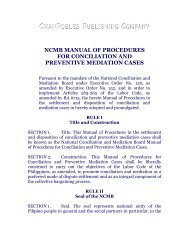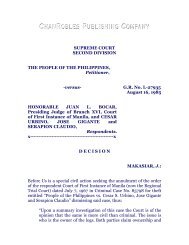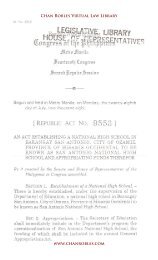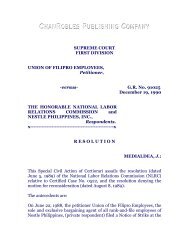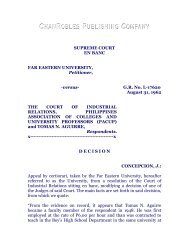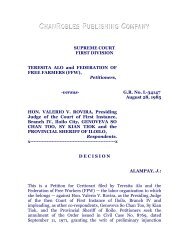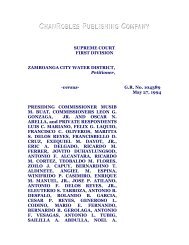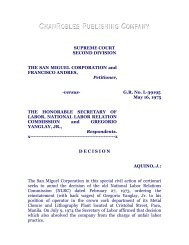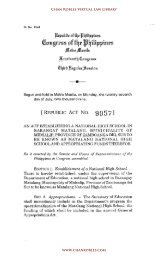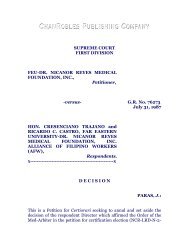J. D. Legaspi Construction vs. NLRC - Chan Robles and Associates ...
J. D. Legaspi Construction vs. NLRC - Chan Robles and Associates ...
J. D. Legaspi Construction vs. NLRC - Chan Robles and Associates ...
Create successful ePaper yourself
Turn your PDF publications into a flip-book with our unique Google optimized e-Paper software.
SUPREME COURT<br />
THIRD DIVISION<br />
J.D. LEGASPI CONSTRUCTION <strong>and</strong>/or<br />
JESUSITO D. LEGASPI,<br />
Petitioners,<br />
-versus- G.R. No. 143161<br />
October 2, 2002<br />
NATIONAL LABOR RELATIONS<br />
COMMISSION, HERNAN G.<br />
PAGURAYAN, <strong>and</strong> RAMIL PINSAN,<br />
Respondents.<br />
x---------------------------------------------------x<br />
D E C I S I O N<br />
CORONA, J.:<br />
Petitioners assail the Decision of the Court of Appeals dismissing<br />
their petition, thus upholding the validity of the writ of execution<br />
issued by the labor arbiter in an illegal dismissal case decided in favor<br />
of private respondents. chanroblespublishingcompany<br />
The present controversy stemmed from an action for illegal dismissal,<br />
underpayment of wages <strong>and</strong> non-payment of benefits filed by private<br />
respondent against herein petitioners.
In their complaint before the National Labor Relations Commission<br />
(<strong>NLRC</strong>), private respondents alleged that they worked for petitioner<br />
J.D. <strong>Legaspi</strong> <strong>Construction</strong> as electricians from August 1988 until they<br />
were illegally dismissed on April 1, 1995. chanroblespublishingcompany<br />
The labor arbiter scheduled numerous conciliatory conferences but all<br />
were ignored by petitioners despite due notice. Hence, the case was<br />
set for hearing. But petitioners not only failed to submit their position<br />
paper, they also failed to appear on the scheduled date for<br />
presentation of evidence, Thus private respondents were allowed to<br />
present their evidence ex parte.<br />
On January 2, 1997, the labor arbiter [1] rendered his decision, the<br />
dispositive portion of which read:<br />
WHEREFORE, premises considered, respondents are hereby<br />
declared guilty of illegal dismissal, <strong>and</strong> directed to reinstate<br />
complainants immediately to their former position with full<br />
backwages which is hereby fixed to (sic) P99,190.77 as of<br />
December 1996 plus the following monetary awards: chanroblespublishingcompany<br />
For underpayment P5,085.00<br />
For premium compensation 522.00<br />
For holiday pay 362.00<br />
For unpay (sic) overtime compensation 2,038.50<br />
For service incentive leave pay 2,175.00<br />
For 13th month pay 11,382.49<br />
in the total sum of ONE HUNDRED TWENTY THOUSAND<br />
SEVEN HUNDRED FIFTY-FIVE PESOS <strong>and</strong> 76/100<br />
(P120,755.76) for each <strong>and</strong> moral damages of P20,000.00 <strong>and</strong><br />
P10,000.00 exemplary damages for each. chanroblespublishingcompany<br />
Ten (10%) percent of all sum owing to the complainants is<br />
awarded as attorney’s fees. chanroblespublishingcompany<br />
SO ORDERED. [2]<br />
On February 21, 1997, petitioner filed a “Motion for Reconsideration<br />
<strong>and</strong>/or questioning the Monetary Claim on the Judgment Amount
<strong>and</strong>/or Notice <strong>and</strong> Memor<strong>and</strong>um,” claiming that they were denied<br />
their day in court as notices of hearing were not served <strong>and</strong> that, in<br />
view thereof, the Decision should be reconsidered <strong>and</strong> set aside, the<br />
case set anew for trial <strong>and</strong> rem<strong>and</strong>ed to the labor arbiter for further<br />
proceedings. The motion was treated as an appeal by the <strong>NLRC</strong> which<br />
dismissed the same in a resolution dated April 2, 1997: chanroblespublishingcompany<br />
x x x<br />
Records disclose that the aforementioned Appeal was not<br />
accompanied by a cash or surety bond contrary to what is<br />
m<strong>and</strong>ated by law, as provided for under Article 223 of the Labor<br />
Code <strong>and</strong> under Section 6, Rule VI of the <strong>NLRC</strong> New Rules of<br />
Procedure. The “Urgent Ex-Parte Motion for Extension of Time<br />
to Post Surety Bond” filed favorably, as it is clear from Section 7<br />
of the aforementioned Rule that no motion for extension of the<br />
period within which to perfect an appeal shall be allowed. chanroblespublishingcompany<br />
WHEREFORE, in view of the foregoing, the instant Appeal is<br />
hereby DISMISSED for failure to post the required cash or<br />
surety bond. chanroblespublishingcompany<br />
On August 1, 1997, petitioner filed a petition for certiorari under Rule<br />
65 of the Rules of Court before this Court, which sought to annul <strong>and</strong><br />
set aside the above-mentioned April 2, 1997 resolution. On<br />
September 3, 1997, the petition was dismissed by this Court for<br />
failure to remit the amount of P500 as deposit for costs. Entry of<br />
judgment followed in due course. chanroblespublishingcompany<br />
On June 19, 1998, upon motion of private respondents, the labor<br />
arbiter issued a writ of execution against petitioners. Sheriff Ramon<br />
Nonato Dayao issued the Notice of Levy to the Register of Deeds of<br />
Parañaque requesting the proper annotation on the title of petitioner<br />
for the satisfaction of the writ of execution issued by the labor arbiter.<br />
On December 9, 1998, a new counsel for petitioner entered his<br />
appearance <strong>and</strong> moved to quash the writ of execution dated June 19,<br />
1998. He raised before the labor arbiter the following issues: (1) the<br />
writ was improvidently issued as petitioners were not properly<br />
notified of the pendency of a motion for issuance of a writ of
execution; (2) the writ was improperly implemented because<br />
petitioners were never personally served a copy of the writ of<br />
execution issued by the labor arbiter <strong>and</strong> (3) petitioners were<br />
deprived of their right to due process of law because of the gross<br />
negligence of their former counsel. chanroblespublishingcompany<br />
The labor arbiter denied said motion to quash.<br />
On January 8, 1999, petitioners elevated the matter to the <strong>NLRC</strong> by<br />
filing their appeal memor<strong>and</strong>um. However, on June 21, 1999, a<br />
decision was rendered by the latter affirming the assailed December<br />
9, 1998 Order of the labor arbiter. A motion for reconsideration was<br />
filed on July 26, 1999 seeking to reverse <strong>and</strong> set aside the decision<br />
dated June 21, 1999 <strong>and</strong> praying that judgment be rendered quashing<br />
the writ of execution <strong>and</strong> canceling the annotation on the title. On<br />
August 18, 1999, the <strong>NLRC</strong> denied the motion for reconsideration.<br />
Unfazed, petitioner went up for the second time to the Court of<br />
Appeals via a petition for certiorari under Rule 65 of the Rules of<br />
Court, harping on the alleged denial of due process brought about by<br />
the incompetence of their previous counsel. chanroblespublishingcompany<br />
The Court of Appeals dismissed the petition:<br />
Note that from the inception of the case the address of<br />
petitioners as appearing on record of the <strong>NLRC</strong> <strong>and</strong> where the<br />
sheriff had served the notice is at “98 Amity Ext. Annex 16-18<br />
Better Living Subdivision, Parañaque, Metro Manila. The<br />
sudden change of address was never brought to the attention of<br />
the <strong>NLRC</strong> <strong>and</strong> petitioners faulted their former counsel for his<br />
inaction. It may be true that there was apparent negligence on<br />
the part of petitioners’ counsel in not informing the <strong>NLRC</strong> on<br />
the change of address, however, petitioners themselves are not<br />
entirely blameless for they should have taken the initiative to<br />
inform the office of the labor arbiter of the change of address,<br />
for what is at stake here is their interest in the case. Moreover,<br />
they cannot be credited with good faith in changing their<br />
address, in fact, their act of transferring to another place would<br />
draw a suspicion that they were trying to evade or escape<br />
obligations. Hence, for failure to notify the office of the labor
arbiter, petitioners bear the loss, as ratiocinated in the cases of<br />
Greenhills Air-conditioning <strong>and</strong> Services, Inc. <strong>vs</strong>. National<br />
Labor Relations Commission, 245 SCRA 384 <strong>and</strong> Five Star Bus<br />
Co., Inc. <strong>vs</strong>. Court of Appeals, 259 SCRA 120, to wit: chanroblespublishingcompany<br />
A client is bound by the negligence of his counsel.<br />
WHEREFORE, foregoing considered, the petition for<br />
certiorari is hereby ordered DISMISSED for lack of merit.<br />
Petitioners then filed the instant petition before this Court.<br />
Petitioners raise the following issues:<br />
WITH DUE RESPECT, THE HONORABLE COURT OF<br />
APPEALS SERIOUSLY ERRED AND ACTED CONTRARY<br />
TO LAW AND JURISPRUDENCE IN RENDERING THE<br />
ASSAILED DECISION AND RESOLUTION CONSIDERING<br />
THAT:<br />
A. THE LABOR ARBITER’S DECISION IN <strong>NLRC</strong>-NCR<br />
CASE NO. 00-04-02473-95 WAS RENDERED IN<br />
GROSS VIOLATION OF PETITIONER’S<br />
CONSTITUTIONAL RIGHT TO DUE PROCESS,<br />
HENCE, THE SAME IS VOID AND, THEREFORE,<br />
CANNOT ATTAIN FINALITY AND BE THE SUBJECT<br />
OF EXECUTION OR IMPLEMENTATION. chanroblespublishingcompany<br />
B. THE HONORABLE COURT OF APPEALS SKIRTED<br />
THE ISSUE OF PETITIONERS BEING DEPRIVED OF<br />
THEIR RIGHT TO DUE PROCESS, WHICH ISSUE<br />
WAS RAISED SQUARELY BY PETITIONERS IN CA-<br />
G.R. SP NO. 55496.<br />
C. THE HONORABLE COURT OF APPEALS SHOULD<br />
HAVE REMANDED THE CASE BACK TO THE<br />
LABOR ARBITER TO AFFORD PETITIONERS THEIR<br />
DAY IN COURT. [3] chanroblespublishingcompany
At the outset, the Court takes notice of the fact that petitioners<br />
already exhausted all remedies available to them way back September<br />
3, 1997 when this Court dismissed their petition for certiorari<br />
questioning the legality of the <strong>NLRC</strong>’s decision against them. It has<br />
been five years since then <strong>and</strong> petitioners are still brazenly attempting<br />
to delay this case further. They claim to have been denied due process<br />
of law.<br />
We are not convinced.<br />
Denial of due process means the total lack of opportunity to be heard<br />
or to have one’s day in court. There is no denial of due process where<br />
a party has been given an opportunity to be heard <strong>and</strong> to present his<br />
case. [4] chanroblespublishingcompany<br />
In the case at bar, petitioners were represented by counsel during the<br />
hearings conducted by the labor arbiter on April 24, 1995, May 16,<br />
1995 <strong>and</strong> June 25, 1995; they were served with summons; they<br />
received the notices for the hearings conducted on July 19, 1995,<br />
August 2, 1995 <strong>and</strong> August 16, 1995, <strong>and</strong> they received a copy of the<br />
labor arbiter’s decision dated January 2, 1997. chanroblespublishingcompany<br />
Moreover, petitioners filed a series of pleadings <strong>and</strong> motions, an<br />
appeal <strong>and</strong> a motion for reconsideration with the <strong>NLRC</strong> <strong>and</strong> a<br />
petition for certiorari with the Supreme Court. After all these<br />
remedies proved futile, petitioners filed a motion to quash the writ of<br />
execution which dragged the case even more <strong>and</strong> effectively derailed<br />
the execution of an already final <strong>and</strong> executory judgment. The issue of<br />
lack of due process was raised in all of the above-mentioned pleadings<br />
<strong>and</strong> was exhaustively passed upon. Clearly, petitioners were not<br />
denied due process. chanroblespublishingcompany<br />
The Labor Arbiter’s decision has long become final <strong>and</strong> executory <strong>and</strong><br />
it can no longer be reversed or modified.<br />
The Court has on occasion ruled that:<br />
Now, nothing is more settled in law than when a final judgment<br />
becomes executory, it thereby becomes immutable <strong>and</strong><br />
unalterable. The judgment may no longer be modified in any
espect, even if the modification is meant to correct what is<br />
perceived to be an erroneous conclusion of law or fact, <strong>and</strong><br />
regardless of whether the modification is attempted to be made<br />
by the court rendering it or by the highest court of the l<strong>and</strong>. The<br />
only recognized exception are the correction of clerical errors or<br />
the making of so called nune pro tunc entries which cause no<br />
injury to any party, <strong>and</strong>, of course, where the judgment is void.<br />
(Manning International Corp. <strong>vs</strong>. <strong>NLRC</strong>, 195 SCRA 155 [1991]).<br />
We now delve into the propriety of the implementation of the<br />
writ of execution. Petitioners claim they were never personally<br />
served a copy of the writ of execution; <strong>and</strong> that their real<br />
property was levied upon without their first having been given a<br />
chance to satisfy the judgment <strong>and</strong> without any prior effort to<br />
levy upon their personal properties. chanroblespublishingcompany<br />
Pertinently, Paragraph 2, Section 2 of the <strong>NLRC</strong> Manual on Execution<br />
of Judgment provides:<br />
(a) If the execution be for the payment of a sum of money by<br />
the losing party, the writ shall be served by the sheriff upon the<br />
losing party or upon any person required by law to obey the<br />
same before proceeding to satisfy the judgment out of the<br />
personal property of such party <strong>and</strong> if no sufficient personal<br />
property can be found, then out of his real property. chanroblespublishingcompany<br />
As the records show, the <strong>NLRC</strong> sheriff [5] followed the procedure<br />
provided in the above-quoted provision of the <strong>NLRC</strong> Manual on<br />
Execution of Judgment but was unable to serve a copy of the writ of<br />
execution <strong>and</strong>/or levy upon their personal properties due to the<br />
contumacy of the respondents therein (petitioners before us). In his<br />
letter dated July 17, 1998 addressed to petitioners’ counsel, the <strong>NLRC</strong><br />
sheriff stated that, in view of the refusal of Mr. Jesus D. <strong>Legaspi</strong> to<br />
comply with the m<strong>and</strong>ate of the writ of execution, Transfer Certificate<br />
of Title No. 77731 would be levied upon <strong>and</strong> attached to satisfy the<br />
judgment. In his progress report dated August 19, 1998, he stated<br />
that: “On July 2, 1998, enforcement of the writ of execution was done<br />
upon the respondents, however, entry inside the premises had been<br />
impossible, passage thereon has been closed <strong>and</strong> padlocked <strong>and</strong> no<br />
people/person around which (can be) served with the Writ.”
Considering these circumstances, it cannot therefore be said that the<br />
writ of execution was improperly implemented. chanroblespublishingcompany<br />
It is obvious to the Court that petitioners <strong>and</strong>/or counsel are just<br />
playing a dilatory game, perhaps to break down the will of the<br />
respondents or to maneuver for a possibly better bargaining position<br />
with respect to respondents’ claims or for whatever other reason<br />
known only to them. There was no purpose to be served by changing<br />
one’s counsel <strong>and</strong> blaming the previous one for an adverse decision<br />
which was doubtlessly correct to begin with. chanroblespublishingcompany<br />
WHEREFORE, the petition is hereby DENIED. Treble costs<br />
against petitioner.<br />
SO ORDERED.<br />
Puno, Panganiban <strong>and</strong> Morales, JJ., concur.<br />
S<strong>and</strong>oval-Gutierrez, J., on leave.<br />
chanroblespublishingcompany<br />
[1] Atty. Ariel Cardiente Santos.<br />
[2] Rollo, pp. 85-86.<br />
[3] Rollo, p. 29. chanroblespublishingcompany<br />
[4] Development Bank of the Philippines <strong>vs</strong>. National Labor Relations<br />
Commission, Ong Peng, et al., 218 SCRA 183 (1993). chanroblespublishingcompany<br />
[5] Ramon Nonato Dayao.


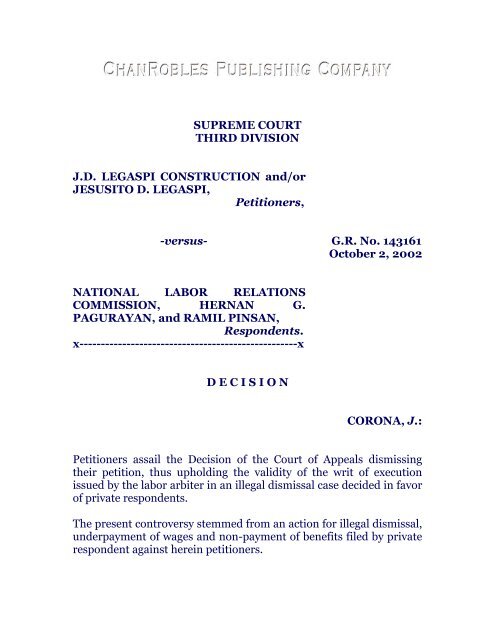
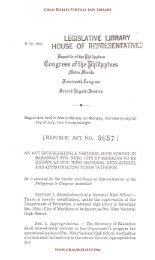
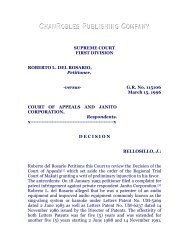
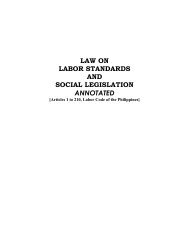
![Aurelio vs. NLRC, (221 SCRA 432 [1993]) - Chan Robles and ...](https://img.yumpu.com/51280528/1/190x245/aurelio-vs-nlrc-221-scra-432-1993-chan-robles-and-.jpg?quality=85)
